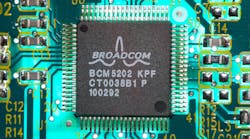Broadcom Bids $105 Billion for Qualcomm, Which Seems Likely to Decline
Broadcom offered to buy Qualcomm in a $105 billion deal Monday that would create a powerhouse in wireless chips used from smartphones and routers to cars and cellular base stations.
The offer is nothing more than an offer. But if the deal went through, it would slap an exclamation point on the recent wave of corporate matchmaking in the chip industry, which has slowed in the last year but not flickered out. Chipmakers are still looking for scale as the selling price of chips falls and development costs soar.
With Qualcomm and its massive cache of patents, Broadcom would hold court over chips that allow all types of devices to communicate wirelessly. In addition to basic parts like filters and switches, Broadcom sells Wi-Fi and Bluetooth chips. These products would dovetail with Qualcomm’s cellular modems and mobile processors, giving Broadcom a tight grip on the smartphone supply chain.
Broadcom also sells wired communications chips to customers like Ericsson and Nokia, which sell cellular infrastructure to connect all these smartphones and other gadgets. For 5G, wireless carriers could deploy millions of small cells to blanket cities in wireless coverage. The company also sells chips used in home Wi-Fi routers.
“With greater scale and broader product diversification, the combined company will be positioned to deliver more advanced semiconductor solutions for our global customers and drive enhanced stockholder value,” said Hock Tan, the voracious dealmaker and financial wonk who serves as Broadcom’s chief executive officer, in a statement.
Broadcom is willing to pay $70 per share, which represents a 28% premium over Qualcomm’s stock price last Thursday before the proposal leaked. Thomas Krause, Broadcom’s chief financial officer, said that the new company would haul $42 billion of annual revenue, making it the world’s third largest chipmaker behind Intel and Samsung.
But the bid raises the question of whether Qualcomm, the world’s largest maker of smartphone chips, would be willing to change course after plotting to buy NXP Semiconductors for $47 billion. Qualcomm is betting that the deal will punch its ticket into growing markets like connected cars, factory sensors, and smartphones that double as electronic wallets.
In a statement, Qualcomm only said that it was reviewing Broadcom's bid. Some analysts have said that the offer is too low, while others doubt that the deal will survive a gauntlet of antitrust regulators. The Financial Times reports that Qualcomm may be crafting its rejection letter, while Bloomberg reports that Broadcom is preparing for a proxy battle.
Qualcomm is in a weakened state. It is facing regulatory blowback from its licensing business, which reaps royalties from standard 3G and 4G technology patents. Qualcomm, whose stock has fallen 25% over the last year, is also fighting a revolt from Apple, which has refused to pay billions of dollars of royalties on those patents.
Qualcomm has also struggled to close the deal for NXP, which is based in Eindhoven, the Netherlands. In Europe, regulators are weighing whether the deal hurts competition. And NXP shareholders are grumbling that Qualcomm’s offer of $110 per share is too low. A condition of Broadcom’s deal is that Qualcomm does not raise the price.
With or without NXP’s business, Broadcom would face significant regulatory scrutiny. Its bid came less than a week after Tan appeared with President Trump to announce that Broadcom would move its legal base to the United States from Singapore. Many analysts viewed these Oval Office overtures as a way of currying favor for the deal.
Tan played down the uncertainty on Monday in a letter to Qualcomm’s board of directors. “We would not make this offer if we were not confident that our common global customers would embrace the proposed combination, and we do not anticipate any material antitrust or other regulatory issues,” he said. Broadcom’s bid was unsolicited.
Broadcom – a product of Avago’s $37 billion takeover of Broadcom Corp. – seems to be testing the limits of its semiconductor ambitions. In July, the Committee on Foreign Investment in the United States halted its $5.9 billion bid for communications chipmaker Brocade, raising the possibility that the Trump administration could block the deal.

